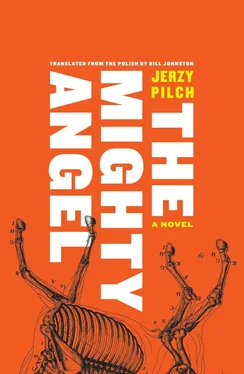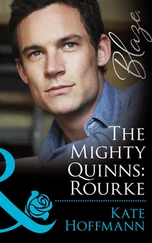Jerzy Pilch - The Mighty Angel
Здесь есть возможность читать онлайн «Jerzy Pilch - The Mighty Angel» весь текст электронной книги совершенно бесплатно (целиком полную версию без сокращений). В некоторых случаях можно слушать аудио, скачать через торрент в формате fb2 и присутствует краткое содержание. Год выпуска: 2009, Издательство: Open Letter, Жанр: Современная проза, на английском языке. Описание произведения, (предисловие) а так же отзывы посетителей доступны на портале библиотеки ЛибКат.
- Название:The Mighty Angel
- Автор:
- Издательство:Open Letter
- Жанр:
- Год:2009
- ISBN:нет данных
- Рейтинг книги:5 / 5. Голосов: 1
-
Избранное:Добавить в избранное
- Отзывы:
-
Ваша оценка:
- 100
- 1
- 2
- 3
- 4
- 5
The Mighty Angel: краткое содержание, описание и аннотация
Предлагаем к чтению аннотацию, описание, краткое содержание или предисловие (зависит от того, что написал сам автор книги «The Mighty Angel»). Если вы не нашли необходимую информацию о книге — напишите в комментариях, мы постараемся отыскать её.
A simultaneously tragic, comic, and touching novel,
displays Pilch’s caustic humor, ferocious intelligence, and unparalleled mastery of storytelling.
The Mighty Angel — читать онлайн бесплатно полную книгу (весь текст) целиком
Ниже представлен текст книги, разбитый по страницам. Система сохранения места последней прочитанной страницы, позволяет с удобством читать онлайн бесплатно книгу «The Mighty Angel», без необходимости каждый раз заново искать на чём Вы остановились. Поставьте закладку, и сможете в любой момент перейти на страницу, на которой закончили чтение.
Интервал:
Закладка:
They came to the Christmas Eve dinner with empty hands, in pajamas and dressing gowns; every second one of them had bandaged wrists. The nurses from the suicide ward who brought them here were beautiful, dark-complexioned, and tense as devils. They evidently believed it was easier to watch over a fragment of wall or grass or sky as it vanished from the mind, without moving from where one is — which, let it be said openly, is a classic delusion of the young.
They came with empty hands, but we were ready with hospitality. The little tables in the rec room had been arranged into one single long table; if their laminated tops hadn’t been as hard as granite they would have sagged under the weight of the food. First of all there was barszcz with potatoes, then breaded cod, then Chinese instant soups of various kinds, different sorts of cheese, six different kinds at the very least, pickled cucumbers, any amount of pretzel sticks, potato chips, four cans of sardines, two jars of rollmops, oranges, tangerines, apples, bread rolls, yeast buns, and a box of candies — whatever anyone happened to have, whatever anyone had been given, whatever could be bought at the little store on the first floor. Dr. Granada had already shared the traditional Christmas wafer with us earlier in the afternoon; he had wished each of us good health and all the best, then he’d thrown his everlasting sheepskin round his shoulders, climbed into his Ford Sierra, and set off for some part of the world that was uncertain, quite unnecessary and, from our point of view, in all probability non-existent. Good health and best wishes, we repeated now with childlike seriousness; the suicides weren’t even able to say good health and best wishes, but merely returned the softest of handshakes, while the barely perceptible shadow of a smile passed over their romantic countenances. We ate in silence; the meal took its course without elaborate orations and without animated conversation. Only the Sugar King, who was wearing a garish emerald-green track suit, retained his usual pathetic nonchalance; he was crumbling his third packet of Chinese soup into his bowl and dissolving the dry powder, with a kind of villainous dexterity, in boiling water from a kettle as huge as a nightstand.
“Soup is the most important thing,” the Sugar King was saying, “soup is the foundation. Well-prepared soup is an absolutely crucial matter. The soup makes the home, you might say. In my home, I’m telling you, in my home there were four different kinds of soup for Christmas Eve dinner. That’s right,” he would repeat exultingly, “four different kinds: clear barszcz, barszcz with dumplings, mushroom soup, and żurek . And of course, on top of that there was carp, pike in jelly, bigos, kutia . .”
Our heads and our entire selves drooped lower and lower; the Queen of Kent’s gray hair was touching the paper tablecloth, Christopher Columbus the Explorer took out his French translation of the New Testament and began thumbing through it, two more nurses left and two more returned from the nurses’ station. Those ever more angelic angels of ours kept going there and coming back the whole time, as if overcome by a mysterious urge to constantly be stretching their legs. Only the suicides remained impassive, sitting up straight like an Olympic team composing themselves before the game.
“Talk about dull,” groaned the Most Wanted Terrorist in the World.
The delivery of inappropriate monologues was, as it happened, the speciality of the Sugar King, in civilian life a wealthy entrepreneur; in every situation he managed to say something improper. More: Unaware of his own desperation, he would plow ahead and develop dangerous theses, and when he finally checked himself, realizing the extent of the faux pas he had committed, the worst would come: that burly sixty-year-old in the emerald-green track suit would burst into terrible tears of embarrassment, and often it was the longest time before he could be consoled. Now the tears came quickly. The inappropriate monologue had not even managed to attain the full extent of its inappropriateness when the emerald-clad shoulders began to quake. The Sugar King gave a cough and snorted like a wild boar; someone from a different world might have thought he was choking, but no, this was one of his tragic spasms, and the first teardrops fell into his third bowl of Chinese soup.
“Talk about dull,” repeated the Most Wanted Terrorist in the World; the mocking distaste in his voice contained a curious note of admiration.
“That’s not dull.” The Hero of Socialist Labor was the first to bring hurried consolation and to offer, with a greater or lesser level of superficiality, his approval of the Sugar King’s problematic speech. “That’s not dull, it’s simply concrete knowledge. Knowledge and experience. Take me, for instance”—the Hero of Socialist Labor performed a skillful imitation of vitality and of bliss flooding his entire being—“take me, for instance, whenever I would start drinking, first I’d make myself a big pot of soup, best of all cabbage soup. .”
“You’re lying, you’re lying for the other fellow’s sake.” This time, in the voice of the Most Wanted Terrorist in the World there could be heard a lazy yet unshakeable demur. “You’re a good person yourself and that’s why you’re lying, but you’re lying in a general sense. Either a person starts drinking or they make soup. Either-Or, as a certain philosopher used to say.”
“Was I intending to drink or was I not?” As frequently happens to good-natured people, the Hero of Socialist Labor was gripped by sudden rage. “Was the need for drink rising within me relentlessly, or was it not? Before that need rose to the point of irresistibility, did I made soup, or did I not? It may be that that was not always the case, but it was the case sufficiently often for me to know what a consolation it is to have a mouthful of cabbage soup, even cold. After all, hunger doesn’t come often and it doesn’t last long; many times a person doesn’t even know he’s hungry, he doesn’t know for instance that he wakes in the night, gets up, goes to the kitchen, opens the refrigerator, sometimes a person doesn’t even know that he takes out the pot, there’s lots of things a person doesn’t know, but the refreshing mouthful of ice-cold broth going down his throat can always be felt. And later too”—the Hero of Socialist Labor’s good humor had returned with neurotic rapidity—“and later too, when he’s recovering, the soup is indispensable also. Take me, for instance, when I’m recovering, my favorite part is replenishing my mineral salts. And what’s the best thing for replenishing mineral salts?”
The sound of music was heard. Don Juan the Rib had taken out his mouth organ and was playing the music from the Christmas carol Tiny Infant Jesus . The Hero of Socialist Labor continued speaking for a good time longer, in an ever quieter voice, accompanying the carol; he sang the praises of broths rich in mineral salts, the plaintive melody and the matter-of-fact parlando creating an extraordinary duet. If I had made the scene up I’d know how to describe it, but I was there, I saw it, I heard it, and thus I’m powerless. The simple music drifted across the rec room, past the nurses’ station and through all the rooms of the alco ward; snippets of lines passed through our sieve-like heads, Don Juan the Rib (in civilian life a hairdresser, and additionally a musician, as he used to say about himself) played one carol after another, and we with our ravaged brains were unable to sing, we couldn’t recall a single verse, not even the first one, tiny infant Jesus. “God is born, the powers quail,” played Don Juan the Rib, “the fire is stilled, the light must fail,” not another word. It may have been during this carol, or perhaps during “Wise men of this world and kings, whither do you hasten,” or perhaps during “On Christmas day is sweet elation Felt through all of God’s creation,” that Simon Pure Goodness began for the hundredth time to tell the story of his Christmas delirium of the previous year. That is just how it was, I’m not relying on my sieve-like memory, but on the hundred-page lined notebook in which the following day, Christmas Day (horrified by my own condition, horrified by the fact that I didn’t remember the best-known carols, not a single word), I began to write everything, literally everything, down on paper. I wrote the whole of Simon’s Christmas story; admittedly I didn’t write down exactly which carol was playing when he began to tell it (when it comes down to it that is of little significance; and I didn’t write it down because the next day I didn’t remember), but I did write down the way the men overlapped one another, as if in a child’s counting-out rhyme — before the first had finished talking the second began to play, and before the second had finished playing, the third started to tell his story.
Читать дальшеИнтервал:
Закладка:
Похожие книги на «The Mighty Angel»
Представляем Вашему вниманию похожие книги на «The Mighty Angel» списком для выбора. Мы отобрали схожую по названию и смыслу литературу в надежде предоставить читателям больше вариантов отыскать новые, интересные, ещё непрочитанные произведения.
Обсуждение, отзывы о книге «The Mighty Angel» и просто собственные мнения читателей. Оставьте ваши комментарии, напишите, что Вы думаете о произведении, его смысле или главных героях. Укажите что конкретно понравилось, а что нет, и почему Вы так считаете.












